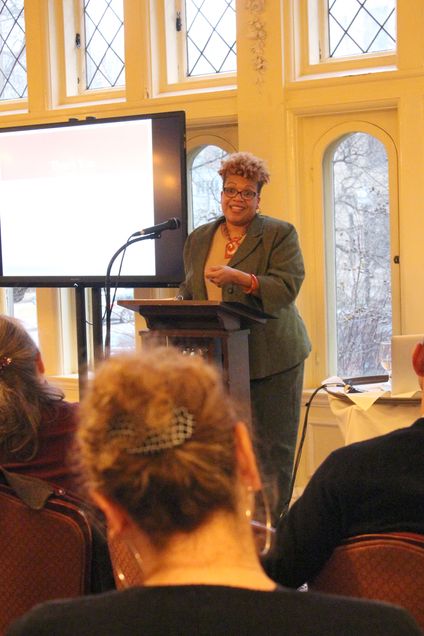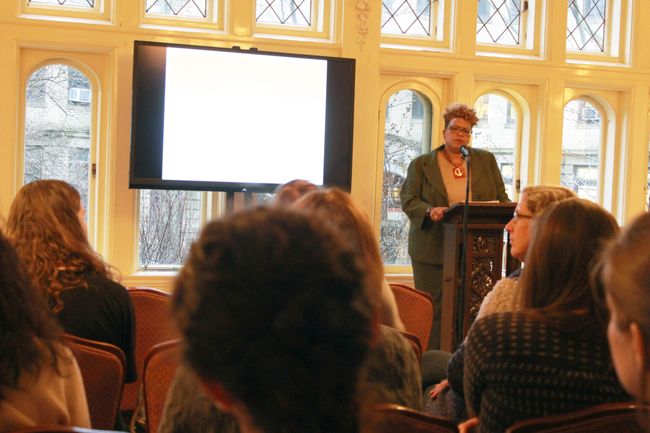Special Lecture: “The Sociocultural Context of Coping: Homicide Victims and African American Survivors,” with University of Maryland Professor Tanya Sharpe
On January 24 at the BU Castle, BU School of Social Work welcomed University of Maryland Professor Tanya Sharpe. Sharpe’s lecture, entitled, “The Sociocultural Context of Coping: Homicide Victims and African American Survivors,” focused on her work and research around the African American experience of homicide victimization.
 “My commitment to build a legacy of research is a professional one but also a very personal one,” Sharpe told the audience. “African Americans experience homicide victimization more so than any other group in the United States.”
“My commitment to build a legacy of research is a professional one but also a very personal one,” Sharpe told the audience. “African Americans experience homicide victimization more so than any other group in the United States.”
“When you think about who the majority of homicide victims are (young Black men living in urban areas), when you realize that while African Americans make up only 13% of the US population and yet they account for more than half of homicide victims, when you understand that on average African Americans experience the homicide of a loved one at least two times in their lifetime, you begin to realize that we are dealing with an epidemic that disproportionately impacts our most vulnerable.”
Through the use of qualitative and mixed methods research designs, Sharpe began to develop a culturally-relevant intervention and tool of measurement designed to support African Americans in coping with their grief.
Three research questions guided her work:
- What is the post-homicide experience of African American survivors of homicide victims?
- What supports do African American survivors rely upon to cope with the homicide of their loved one?
- How do African Americans cope with the homicide of a loved one?
Sharpe developed a pilot study with Roberta’s House Grief and Loss Center in Baltimore, called the Homicide Transformation Project. The program provides, “psychoeducation support for African American survivors of homicide victims in coping with the murder of their loved one.” Sharpe said one of the first challenges is getting participants to understand what grief is and how it impacts a person. From there, participants figure out next steps for coping and moving forward.
In 2014, Sharpe was asked to complete a coping with homicide violence training with Baltimore’s Safe Streets outreach program. “[Safe Streets] is built upon a public health model of intervention. The idea for Safe Streets outreach workers, who are individuals who have been involved in a life of crime themselves or are from extremely violent neighborhoods, is to hire them to engage with individuals who are involved in a life of crime or could be. The idea is to interrupt the violence.”
 “If you can imagine, the Safe Streets outreach workers—the number of homicides they are surviving,” Sharpe said. “What we realized in this training was that we were just scratching the surface.”
“If you can imagine, the Safe Streets outreach workers—the number of homicides they are surviving,” Sharpe said. “What we realized in this training was that we were just scratching the surface.”
As a result of the needs identified, Sharpe and Safe Streets were able to receive funding to implement the Support Our Survivors project. The project was informed by the model for coping for African American survivors of homicide victims and aims to improve the delivery of trauma-informed care.
In an effort to bring researchers exploring this topic together, Sharpe recently launched a Homicide Research Consortium. The group works collaboratively to submit publications and grant applications. “There are a very small handful of us across the country doing this work,” Sharpe told the audience.
Tanya Sharpe, PhD, MSW, is an Associate Professor at the University of Maryland School of Social Work. Sharpe is the recipient of the Governor of Maryland’s Victim Assistance Award.